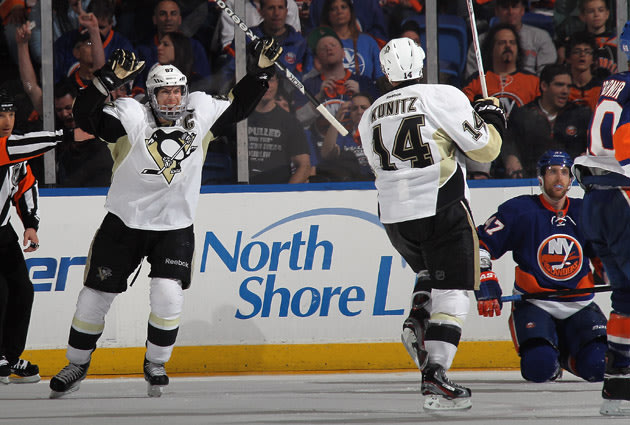May 6, 2013

No one is going to sit here and disagree that wide-open hockey is preferable to the brand displayed by teams trying to grind out wins.
No one likes board play. No one likes a thousand guys standing in the neutral zone during breakouts. No one — as we learned when the Rangers did it last year — likes the focus to be on blocking shots. No one likes obstruction.
For this reason, we are told so very often that the most important things officials can do in the playoffs is "let the boys play."
It's a fun concept. When the whistles are away, teams are allowed to play at 5-on-5 hockey which is obviously the best way to determine which is better. Ideally, all 60 minutes of every playoff game would be played at even strength. But the problem with this insistence on letting guys play is that when you do so, they tend to start committing penalties, and that, in turn, necessitates that, at some point, some of the infractions actually have to be called.
So while it's all well and good to say that for the sanctity of any individual game to be upheld, the referees should certainly not start blowing the whistle and sending guys to the box, the fact of the matter is that it's their jobs to do so. Guys break the rules, guys go to the box.
This, for some reason, doesn't make sense to people at all times.
Take, for example, Brian Strait's penalty on Sidney Crosby in overtime yesterday afternoon, a call which resulted in the Penguins' power play overtime game-winner. That it was called in overtime was somehow this egregious thing, according to Mike Milbury and Jeremy Roenick and a thousand thousand Internet commenters, a decision made by a referee overstepping his bounds.
Had this call — which was the right one because Strait got beat on the inside, took his hand off his stick and pulled Crosby down from behind, easy-ish fall or not — been made in the first period, the number of eyebrows it raised around the hockey universe would have been precisely zero. This is the kind of thing that typically happens when a coach puts a decent enough defenseman like Brian Straiton the ice in a high-leverage situation against a generational talent like Sidney Crosby, after all.
But that it happened in overtime was somehow outrageous.
The thing is, I thought we all agreed that what we want out of referees most of all consistency. Did I miss the memo that this is the kind of thing that should go straight out the window once 14 teams get eliminated?
If guys are allowed to tackle players to the ice as much in the first 20 as they are the final five, then that's fine. You know what you're getting. But for the sake of the players and coaches, knowing exactly what will and will not constitute a minor penalty is very important. Jack Capuano is going to kick and scream about the call, and it's tough to blame him considering how hard and well his team played for the majority of the afternoon, but if that same play had happened at the other end of the ice, with Mark Eaton yanking on John Tavares' jersey from behind as he drove to the net, then gee whiz wouldn't he just think that was the best call in the world?
That anyone would complain about a soft call there seems silly given what we know about the state of officiating in the NHL today. The expectation a million years ago was that you had to essentially draw blood on a crosscheck to the face to get a call in OT, and because hockey is nothing if not stuck in its ways, that's the prevailing attitude even if reality doesn't bear out that this is the way things should go.
If you don't call it that way, you get situations like what happened to the Rangers on Saturday. Karl Alzner put the puck over the glass with 46 seconds to go in the third period of a tie game. No one touched it on the way up and over. It didn't hit the glass. This should have been, by rule, a two-minute minor for delay of game. This happened plain as day. But it came just a few minutes after the expiry of a slashing penalty on Troy Brouwer, and thus, it seems that was enough to convince officials, who huddled up to confer, that something — anything, really — must have happened to prompt Alzner to swipe the puck into the fifth row.
Then, when Steve Oleksy did it again early in the first overtime, that was apparently enough. Can't ignore two of them. Ryan McDonagh doing the same a little more than five minutes after that led to the power play that ended the game. And while, given the state of the Rangers' power play, it seems unlikely that they would have scored on the one unjustly denied them, this is what happens when you don't call things by the letter of the law.
Penalties are, I understand, a matter of subjectivity to some extent, but not in this case: A puck over the glass without touching anything is a penalty every time, or at least is supposed to be.
I don't know how you let that become an issue of not wanting to call too many penalties against one team in a row in a critical situation if you're an official. It's not your job to keep penalties even, it's your job to get them right. I'd rather have something that's a penalty in the first be called a penalty in the second and a penalty in the third and a penalty in overtime. Everyone knows what's what that way.
Photo: Getty Images


No comments:
Post a Comment